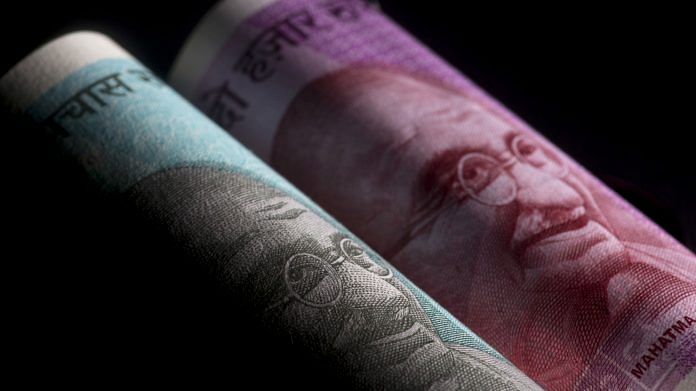
Thank you dear subscribers, we are overwhelmed with your response.
Your Turn is a unique section from ThePrint featuring points of view from its subscribers. If you are a subscriber, have a point of view, please send it to us. If not, do subscribe here: https://theprint.in/
The Economic turmoil that India is witnessing for some time now is said to have been reversed by the present government. Cleaking chains to implement new reforms float on the surface of Indian trust. Ironically, despite the assured claims and talks for reforms, India slipped to the 108th position in the Economic Freedom of the World Report of 165 countries. During the year 2021 Report, the country was situated on 103rd position but presently has fallen behind its sister countries such as Bhutan, Sri Lanka, and Nepal.
Economic freedom is inextricably linked to socio-political and economic upliftment, better policies, and standard of living. Countries with greater economic freedom tend to have better living standards than those without it. They tend to have a higher gross domestic product per capita. Other factors that govern economic freedom include the size of the government and regulation.
The Economic Freedom Index shows that the Prime Minister Narendra Modi-led Bharatiya Janata Party (BJP) Government, India is presently facing the biggest challenge of the cornerstones of recognizing economic freedom. There is a gross infringement on personal choice, voluntary exchange, freedom to enter markets and compete, and security of the person and privately owned property.
Incidentally, many South Asian countries are faring better than India, In this year’s report, which compares 165 countries and territories. Hong Kong SAR, China is again number one, although China’s heavy hand will likely lower Hong Kong’s ranking in future years and Singapore remains at 2nd rank. India (108) trails behind Taiwan (17), Japan (18), Korea (47), Kazakhstan (55), Malaysia (55), Philippines (58), Mongolia (61), Indonesia (70), Thailand (89), Bhutan (92), Srilanka (94), Nepal (99) and Russia (100).
The Economic Freedom of the World report released by the Fraser Institute, based in Canada, substitutes its measurement of economic freedom, on five areas:
- The size of government and taxation,
- Private property and the rule of law,
- Access to sound money,
- Freedom to trade internationally, and tariffs,
- Regulation of business, labor and capital markets.
Overall in the five areas related to economic freedom, India was ranked the following:
- Ranked 49th with 7.39 points in the Size of Government Spending.
- The Justice System ranks 65th with 5.51 points in Property Rights protection.
- Ranked 109th with 7.87 points in Net Money.
- Ranked 135th with 5.84 points in the Freedom of International Trade.
- Declared ranked 120 with 6.57 points in Control.
As per the World Bank, the average per-capita Gross Domestic Product (GDP) in India was 6118.36 US dollars in 2020, when adjusted by Purchasing Power Parity (PPP). The GDP per Capita, in India, when adjusted by PPP is equivalent to 34 percent of the world’s average. As per Pew Research, income levels in India are estimated as the number of poor people with an income of $2 (150 INR) per day or less in PPP, less in a day.
Studies, which span two decades of the period, show that where economic freedom is greater, the rate of investment in the economy is higher and the rate of economic growth is higher. Rising incomes, declining poverty are visible. Also in countries where the economy is free, the political and legal systems are at the forefront of increasing the per capita income of those countries and achieving economic growth.
However, the points achieved here have been swallowed up by the increased corruption in the country. In addition, systemic deficiencies are hurting long-term economic growth. The deficit in the functioning of the judiciary and the legal system, besides pervasive corruption in the economy, has been contributing to slow down the active private sector.
The report said the budget deficit would only increase with government-dominated, extravagant subsidy systems in many sectors. Although Economic reforms in India are in full swing,.The simplification of key services has stopped. However, despite some efforts, they are not enough to move the economy forward. That includes delays in allowing multinational retailers to deliver goods to the public at low prices and the dominance of public sector entities. The Indian economy is likely to be further jeopardized by the continuation of socialist policies. India’s growth rate has slowed down due to a lack of adequate measures for economic freedom and also effective measures to check corruption as a whole.
The rule of law in India as a whole is not the same. The judiciary is witnessing weaknesses in systematizing its independence. The judicial process remains lengthy, costly, and subject to political pressure. Other fallacies include free schemes of the Central Government, the inability to provide effective security for property rights, and deficient protection of intellectual property rights.
About 230 years ago, Adam Smith rightly recognized that economic freedom and the prosperity it brings works in accordance to the advantage of the poor. It is unclear what path the Indian government takes, the path to stick to its political planning or undertake new measures to induce economic freedom.
These pieces are being published as they have been received – they have not been edited/fact-checked by ThePrint.
Also read: SubscriberWrites: India should approach the Ukraine-Russia crisis with caution, not choose sides

COMMENTS